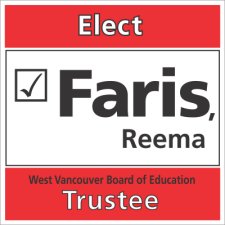Nerves, Questions, and Relevance
I was nervous.
It wasn’t my first speech nor my first All Candidates Meeting, and yet I hadn’t experienced as much anxiety during other principal campaign events, primarily the West Vancouver Citizens for Good Government (WVCGG) endorsement process and the Shaw TV taping.
This time, however, the evening was hosted by the West Vancouver District Parents Advisory Council (WVDPAC) and the audience was made up of parents with children in the public school system as well as educators who work in the district. These are individuals with a deep, passionate interest and commitment to public education and it showed in thequestions we were asked. Questions that ranged from the challenge of a primary school with under-enrollment to our experience with governance to the current job action and more. The most heart-felt question came from a Sentinel Secondary School coach and educator which touched on the application which the Labour Relations Board (LRB) is currently considering: one which includes a request by the employers group for a 15% reimbursement from the British Columbia Teachers’ Federation (BCTF) for services not rendered as part of the on-going labour dispute.

Given the current structure of the public education system in BC, these are some of the toughest questions for a Trustee-candidate to answer because individual Trustees and individual Boards of Education may not wield as much impact as one would expect. While that may lead some to question the relevance of the Boards, I do think they’re essential as I mentioned in my presentation last night and as you’ll see in the accompanying text.
As to my nerves, they gradually wore off to a gentle flutter although having Mom and Dad in the audience, as well as my son, probably helped ramp up my stress level.
Even though it was a school night and I knew we’d be out late, I had my son with me. This was likely to be our last opportunity as Trustee-Candidates to speak to a larger group, and I wanted him to be a part of the process and to share the experience with me. On our way home, I asked what he thought of it all. “It was okay Mama,” he said. “But I thought it would be more like The Debaters on CBC. I thought after the speeches, they’d all talk together, the audience would vote and we’d get to go home.”
It may have been nice to incorporate more humour into the night’s proceedings, but unfortunately not much about education these days is a laughing matter.
Remarks presented at the West Vancouver District Parents Advisory Council (WVDPAC) All Candidates Meeting – November 3, 2011
My thanks to West Van DPAC for hosting this event, to Irene Leschert for moderating, and to you for being here this evening.
Are Boards of Education relevant? That’s a question that’s been put to me a few times since I declared my candidacy last month.
Yes, given the current context, Boards of Education are relevant; I think they’re essential. The Board acts on behalf of the community and helps to ensure that the public education system reflects the community it serves. Having the Board is the way in which we’re able to capture the essence of what’s unique about West Vancouver in the work that’s done in our schools.
That’s today. If, as part of the journey through the 21st century, the structure is to be reviewed, re-evaluated, and reinvigorated, then I’d like to be a part of that conversation to make sure the governance model we choose allows the system to work at its best.
As part of making the system work at its best, I’d like to reassess the monthly public Board meetings. I think there are ways to make the meetings more relevant to the community and to establish them as a forum for dialogue between all stakeholders.
I want to turn now to a subject that I’ve been grappling with and that’s the issue of technology in our schools. I believe that technology will be an integral feature of a great public education system because we live in a digital age and there is no turning back.
Having said that, I’d like to see us take the time to consider the challenge thoroughly and from all perspectives. Let’s take a moment to listen to parents’ concerns and adjust our approach accordingly.
Because, for me, thankfully, the world still operates on the basis of human connection. And to sacrifice that connection for the perceived benefits or cost savings of the latest tech wonder would be, in my mind, a mistake.
I enjoyed watching the video at the DPAC meeting yesterday which profiled the first hundred years of public education in West Van. The interviewer off-camera asked a number of people what they thought schools would look like in the future.
As I reflected on that question, I realized that my vision of personalized learning in the 21st century is not that of a student huddled in front of a computer, surrounded by gadgets all alone inside their home — even though we have the ability to engage people from around the world in multiple conversations in real time from our own spaces.
Let’s embrace technology, but let’s make sure it works for us, and not accept it blindly at the cost of losing the human connections which bind us together.
It’s an exciting time to be involved because we’re on the threshold of new ways and for the sake of our students we have to make sure that what we’re working towards is a better system.
Better for all those involved, but most importantly for the students who deserve to feel that their learning does matter to their future as well-rounded, critically-thinking, engaged citizens.
My name is Reema Faris and I hope I can count on your support at the ballot box on November 19th.
Thank you.